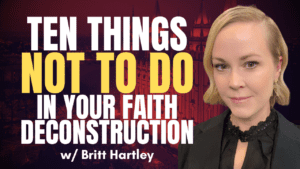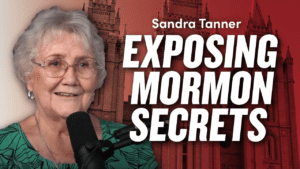In this Mormon Stories series, John and Margi interview three of the hard-working moderators for the “A Thoughtful Faith” Facebook support group. The ATF group is comprised of LDS church members who are working to stay constructively engaged with Mormonism.
Mark Crego, Jeralee Renshaw, and Dan Wotherspoon answer questions about the purpose of the group, but also embark on a fascinating conversation about how they each remain constructively involved in the LDS church while maintaining awareness and concern regarding the more difficult aspects of Mormonism.
Part 1:
Part 2:
Part 1:
Part 2:




15 Responses
Dan Wortherspoon gives me gas! His view of Mormonism is so “nuanced” that he comes across as shallow and dishonest. I much prefer the direct honesty expressed by Mark. Looking forward to Mark’s interview.
l agree, with that, it’s so important to be open honest and upfront where the church and it’s truth claims and history are concerned, thank you mark for standing true to what you believe.
I didn’t know what to expect starting into this, but I had a long drive and a relative is currently trying to discover if they should be in or out.
I left the religion at 12 and then realized I was an atheist around 18 or 19. That wasn’t a big deal as I was on the road to becoming an academic and had a good set of friends. I was occupied enough that the notion of deity wasn’t terribly relevant.
In my mid 20s I started wondering about helping others. The notion of the tithe resonated, but money seemed like a poor measure, I decided to tithe my time – four hours a week. Eventually I came to help friends in and close to my circle and, because I enjoy it so much, have increased my tithe to my waking hours about eleven hours a week. My friends are my wealth and their diversity and goodness is astonishing.
I believe in the fundamental good of most people. We listen to somewhat different drummers, but being good to others and doing good works is central. So when I heard talk turn to the god within us I found a resonance. I wouldn’t use the term god, but that’s my fundamental belief.
I could live with a church like that. I have it with my friends, but my hat is off to those who work towards that kind of inclusiveness. You will make the world a better place.
___
For what it’s worth only two of my closest seven friends are atheists – the others are all over the map.. Religion doesn’t have to get in the way. And I second or third Krista Tippett’s podcast – one of my friends was interviewed last year.
The approach discussed here for staying engaged in mormonism does make sense for someone born in the mormon church. You stay and wrestle with meaning, you discuss whether the book of mormon was a literal translation (in safe zones), you find work arounds for mormon doctrine that seems oppressive, etc.
But who would sign up for this from the get go? Even those engaged in this wrestling and struggling with mormonism – the guests on this podcast – would they advocate someone joining mormonism?
Why encourage someone to join something that once you begin to learn that the Book of Mormon isn’t a literal translation, that the prophets might not be prophets, that racist doctrine was . . . racist, that gay mormons sometimes commit suicide, perhaps in part because of the religious environment, that the teachings about the after-life . . . well, you get the idea. Why encourage someone to join and sign on to some false and arbirary teahings?
Particularly when you know from your own experience that once the truth begins to come out, that convert is going to have to struggle and wrestle with the fact that they followed prophets who didn’t prohesy, struggle with the financial committment they made over years, perhaps mortgaging their retirement in this lifetime, struggle and wrestle and analyze the overwhelming feelings of discovering your committment was made based on false representations.
Why put a potential convert through that? And then the convert learns that not only will they have to wrestle with all of this, but they have to do it in private groups, that they can’t show too much anger, that the can’t be too overt in pointing out they were lied to.
So, for those born in the mormon church, this struggle to find an authentic existence within the confines of family and mormon society makes perfect sense. It is something to wrestle with, to discuss quietly for fear of being ostricized, to hold in your deepest feelings – and I commend those who to wrestle with what was put on their plate through no fault of their own.
But why would anyone else sign up for this?
As a long time MS listener and supporter I find that I can no longer listen to those episodes that talk about making it work. People kill themselves because of LDS teachings. Families are torn apart because of LDS teachings. Almost without exception people are so much happier after leaving Mormonism. I know that I would find myself screaming at my IPhone as I listened so I just move on to the next podcast in the queue!
Bill,
One thing about those who try to stay. I see those people as holding the door open for others to leave. Once someone can talk about their questions and get some validation the path to exit is much easier, in my opinion. Some people stay for this very reason I think.
That is the first time I have heard a “staying to help others leave” explanation. I like it! Thanks for a unique POV.
Is that what the Thoughtful Faith Group is? They would not let me join the group when I asked to join about 6 months ago. Jeralee says it’s because I don’t fit what they want for the group. I have been listening to John for about 6 months and purchased many books to answer my questions. So curious. Would love your thoughts.
Is that what the Thoughtful Faith Group is for? I asked to join about 6 months ago, and Jeralee says I am not a good fit for the group.I thought the group was to help answer questions to increase our faith. Would love to hear from you.
Perfect;y said
I agree. It feels odd to me.
Thank you for doing this series. There are quite a few of us who are still active in order to stay close to our friends and family. It’s bad and good, tricky and confusing sometimes.
Thank you Jeralee for being such an understanding parent who tried so hard to understand her son. I wish my parents and I could connect like that. If you have any recommendations or advise to an adult child who wants to connector with their TBM parents, please send it my way. thanks,
CK
I didn’t know that John started the Thoughtful Faith Group. I wish I could be a part of the group. Jeralee says I am not a fit. I am so confused.
I didn’t know that John started the Thoughtful Faith Group. I wish I could be a part of the group. Jeralee says I am not a fit. I am so confused. With all of my study, I am not sure what to do next. I do not want to be a hypocrite. We built a new home in Kaysville in the midst of the highest concentration of Mormons in the world. I am wondering how I am going to resolve all of my questions.
My personality resonates with truth, so everything that I am learning is deeply disturbing to me. Truth is my guiding star. I have a missionary out and am anxious for his return. I have a son preparing to go on a mission and cannot in good conscience encourage him to go, or bring myself to share what I have been learning. Being a mindful Mormon is nice, but why would God restore the church to the earth in a way that creates such “cognitive dissonance”? I have always followed my heart and have always felt God’s guidance in my life, but in my searching thru church history and listening to podcasts, I am concerned about participating in something that is different than I thought it was. Yes, this episode is triggering to me and confusing for me. I love honoring all people and have lived in that space all my life. However, I am very sobered by all of the historical information. I am also wondering how I can live in an LDS community and be my honest self? I am so confused that I was not admitted to the Thoughtful Faith Group. Questioning everything right now and seeking to stay in a peaceful place while I move through this storm of information.